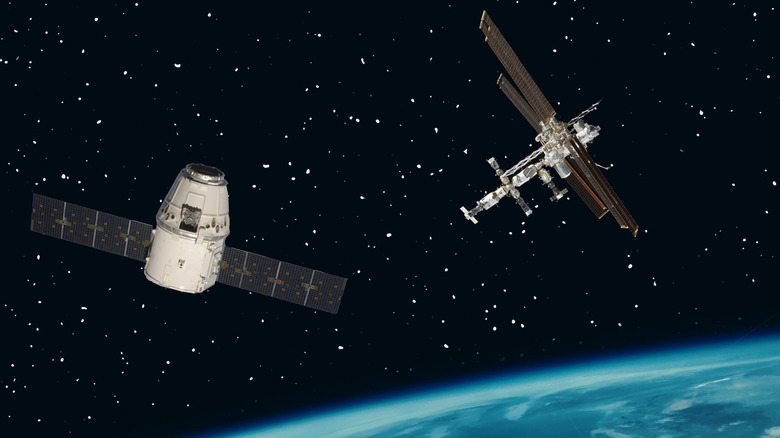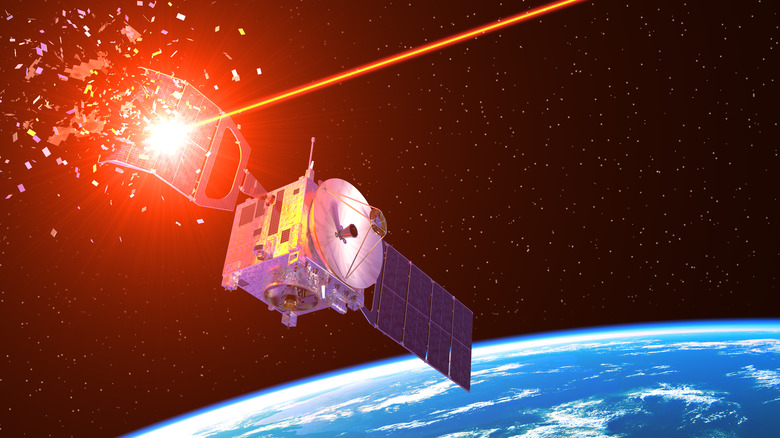China's Massive New Satellite Network Could Be A Total Nightmare For Starlink
The Chinese Government is launching thousands of satellites in an attempt to take on Elon Musk's SpaceX. Specifically, the plan is aimed at suppressing Starlink, the high-speed internet service that relies on a network of satellites in low-earth orbit. Starlink itself has 4,500 satellites in its "first generation network" and clearance to put another 7,500 in orbit. The service is available in most countries and locations around the world, with China being one of the notable exceptions. Starlink is mainly designed to offer high-speed internet to underserved areas at a price that isn't too outlandish. In some locations like rural areas, building the infrastructure a modern cable internet service requires is cost-prohibitive. As a result, millions of people in the United States alone are still stuck with dial-up internet or no service at all. Starlink doesn't require miles of cable, it just needs a satellite receiver and a clear view of the sky.
But the service's applications go far beyond bringing broadband to people living in the sticks. After much of Ukraine's infrastructure was left damaged by Russian missile strikes, Starlink has been invaluable to the country's war effort. The portability of the terminals, and the fact they can only really be interrupted by local jamming, make them an ideal wartime communication tool. Starlink could also be used as the basis for a GPS system, but its owner, Elon Musk, isn't too thrilled with the prospect of his project being used for navigation.
What exactly is China doing?
On the face of it, China is simply launching its own version of Starlink. Close to 13,000 satellites will make up the network, which will be capable of providing internet service worldwide, much like Starlink already does. This could be a boost for nations that aren't currently served by Starlink. These countries include China itself, Russia, Iran, Belarus, Cuba, Venezuela, and Afghanistan. The Chinese government has better relations with many of those nations than the U.S. government does, so the odds are the Asian nation's service will be plugging a gap in the market. However, a study published in the Chinese journal Command Control and Simulation and viewed by the South China Morning Post suggests the satellite network has a more nefarious purpose.
The project, which has been codenamed "GW," is aiming to have around 12,000 satellites in orbit by 2027. Basically, the Chinese government wants its network established before Starlink is actually finished. According to the paper, this is to "prevent the Starlink constellation from excessively pre-empting low-orbit resources." But China's goals may go beyond carving out its own piece of the low-orbit pie.
China's network could suppress Starlink
China's proposed network could be used to impact Starlink directly and in a number of ways. The world's second-largest economy could focus satellites in an area where Starlink has yet to place any of its own, but the problems will really occur when the rival satellites get close to one another. There's a suggestion that China's satellites could be equipped with an "anti-Starlink Payload" which could be used to "suppress" Musk's satellites. The GW satellites could also be used to effectively spy on Musk's network — or conduct "close-range, long-term surveillance of Starlink satellites" if we're using the wording from the paper. At the extreme end, high-tech weapons capable of destroying Starlink satellites could be attached to China's GW satellites. Weapons, including lasers and microwave emitters, may be used to take out Starlink satellites that enter areas the Chinese government believes they shouldn't be in — such as the space over China.
The Chinese government may not be doing this alone either. There is talk of an "anti-Starlink coalition" involving several nations. Political pressure from this group of governments could also be used to "demand that SpaceX publish the precise orbiting data of Starlink satellites." Starlink has yet to issue a response to the plans, but the issue may be getting blown out of proportion. The company has already agreed to get its satellites out of the way of NASA assets when required, so they may work something out with the Chinese government too.


